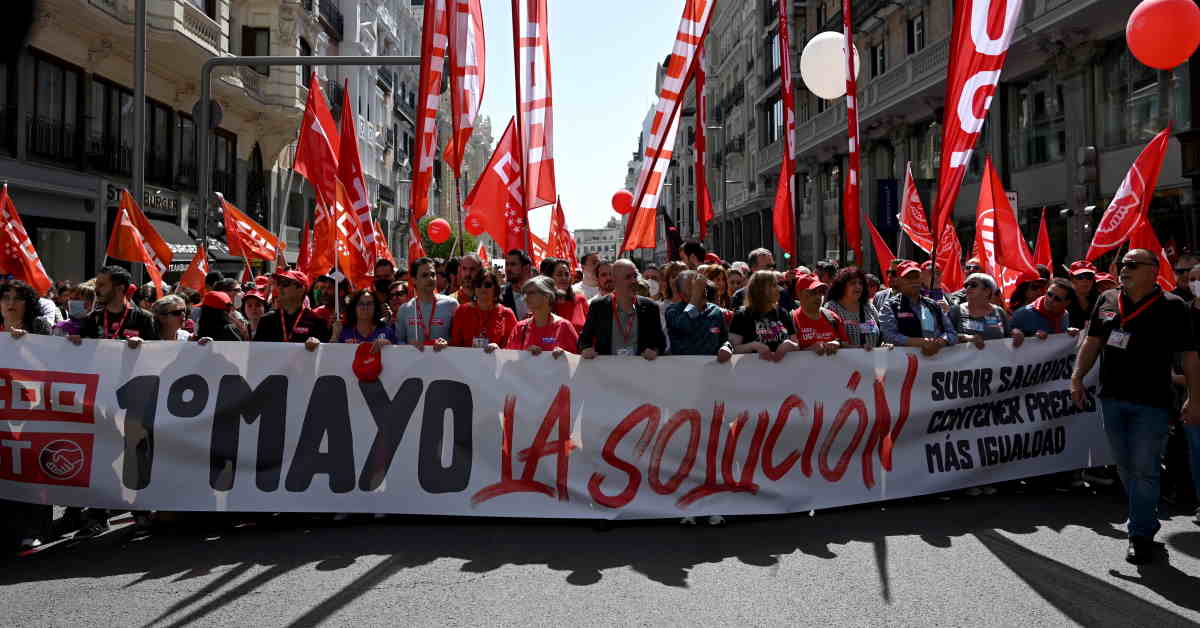Police and protesters clashed in Turkey and France during May Day rallies on Sunday, as tens of thousands marched across the world in support of workers' rights.
Turkish riot police detained scores of demonstrators in Istanbul, pinning some of them to the ground and dragging them away from the rally, which the governor's office said was unauthorised.
And rallies in Paris quickly turned violent as youths clashed with police on the side-lines and buildings were vandalised, though unions said more than 200,000 people joined demonstrations across France and most were peaceful.
1 May is a public holiday in many countries and Sunday saw events on every continent.
European rallies sparked the most controversy with Turkish protesters gathering at Istanbul's Taksim Square, an area synonymous with anti-government protests, chanting "long live labour and freedom, long live May Day".
City officials said the group refused to disperse and 164 were detained, with government-approved rallies elsewhere in Turkey passing off peacefully.
French ministers denounced the violence in Paris and prosecutors said 50 people had been arrested.
Martine Haccoun, a 65-year-old retired doctor, told AFP she came to protest in the southern city of Marseille to show re-elected President Emmanuel Macron "that we didn't give him a blank cheque for five years".
She said many voted for Macron simply to stop far-right challenger Marine Le Pen.
'Not Slogans'
While scuffles were reported in Italian cities including Turin, thousands gathered in London and cities across Germany with no sign of trouble.
In Spain, around 10,000 people joined a demonstration in Madrid and dozens of other cities also held well-attended rallies.
Labour Minister Yolanda Diaz of the communist party said she wanted to show solidarity "with the workers of Ukraine, who today aren't able to protest".
In the Greek capital Athens, more than 10,000 joined rallies against a background of spiralling inflation.
Prime Minister Kyriakos Mitsotakis took to social media to promise a raise in the minimum wage by 50 euros a month.
"We honour the working people not with slogans, but with acts," he wrote on Twitter.
Kenyan Prime Minister Uhuru Kenyatta similarly used his May Day speech to promise a 12 percent hike in the minimum wage, though activists said it was not enough to keep pace with inflation.
'Pull By His Ear'
The mood was uglier in Sri Lanka, where the opposition showed rare unity in calling for President Gotabaya Rajapaksa to resign over the country's worst-ever economic crisis.
"It is time for us to pull him by his ear and kick him out," former legislator Hirunika Premachandra said at a rally in Colombo.
South African President Cyril Ramaphosa was also feeling the heat, being forced to leave an event when miners stormed the stage he was due to speak at and chanted "Cyril must go".
However, other leaders were able to harness the energy of the crowds.
Xiomara Castro, the new president of Honduras, was greeted by thousands chanting her name, and she responded by telling them she would govern for them and put an end to a "dark era" of corruption and drug trafficking.
Elsewhere in Latin America, one leftist-organized group in Buenos Aires protested repaying International Monetary Fund loans, while another group of pro-Argentina government demonstrators praised current policy.
There were also two separate marches in the Venezuelan capital of Caracas, with hospital workers and other basic service employees calling for a "dignified salary" at one demonstration.
"People, listen, join the fight!" they chanted.
President Nicolas Maduro addressed the crowds at a separate pro-government march elsewhere in the city, blaming United States (US) sanctions for his country's "economic storm" and announcing "Venezuela is headed for prosperity".
Thousands of 1 May demonstrators in Chile took to the streets only days after the government announced a 12.5 percent rise in the minimum wage, which is set to reach 400,000 pesos (US$470) per month from August. President Gabriel Boric has said his goal is to raise it to 500,000 pesos by 2026.
May Day came too soon for many in China to enjoy what is usually one of the year's busiest holidays.
A series of lockdowns sparked by rising COVID cases meant restaurants and tourist sites were deserted during what is usually a frenetic period.
"Obviously it's bad in terms of our own self-interest, but it's necessary overall for the good of the country," said a young waiter at a deserted restaurant near the Forbidden City in Beijing.
